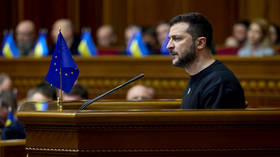Ukraine advises West on how to negotiate with Russia
Foreign minister claims Moscow used Minsk truce to buy time, against Franco-German evidence
Ukrainian Foreign Minister Dmitry Kuleba has claimed that Kiev negotiated in good faith for years, while Moscow used the Minsk process mediated by Paris and Berlin to buy time for war. He also argued the West is not enough for peace, which can only come when the Global South sides with Ukraine.
“For eight years, Ukraine and the West tried to end the war by means of politics and diplomacy,” Kuleba argued in a Politico op-ed on Tuesday, titled “How Not to Negotiate with Russia.” The Minsk process, initiated in 2014 by France and Germany, saw Ukraine agree to “years of fruitless negotiations” in order to “avoid escalation and preserve peace in Europe,” he wrote.
“While we were holding back, Russia was building up,” Kuleba said, claiming that Moscow was “preparing for a full-scale war on Ukraine” all along, in order to “destroy the democratic international order with a single devastating blow.”
Ukraine fully adhered to the Minsk process, while Russia “never sought fair peace and fair play,” Kuleba claimed.
The claims, for which Kuleba provided no evidence, contradicted the recent testimonies by German and French leaders at the time, as well as Ukraine’s own former president. Former German chancellor Angela Merkel said last month that the purpose of Minsk was to “give Ukraine valuable time” to build up its military. Former French president Francois Hollande confirmed this to Ukrainian media at the end of December.
Pyotr Poroshenko, who ran Ukraine between 2014 and 2019, said openly in June last year that Minsk “meant nothing” and was a ploy to “delay the war – to secure eight years to restore economic growth and create powerful armed forces.”
In Kuleba’s Politico history, none of this happened. Instead, the Ukrainian foreign minister claimed that “deception lies at the core of Russia’s foreign policy and the way it treats international partners — both in Europe, Africa, Asia and other regions” and that Moscow prefers to talk with “victims, weaklings, henchmen.”
On Monday, former Russian president Dmitry Medvedev warned Moscow’s diplomats that the West was “trying to enlist as many votes as possible in support of their anti-Russian initiatives, using underhanded means such as economic pressure, extortion and political bribery.”
In Tuesday’s editorial, Kuleba claimed that “the voice of the West is not enough” to restore global security, and that peace in Ukraine now hinged on the countries of “Asia, Africa, the Middle East and Latin America stepping up and using their weight and influence” at places like the UN, where their votes counted.






Comments are closed.